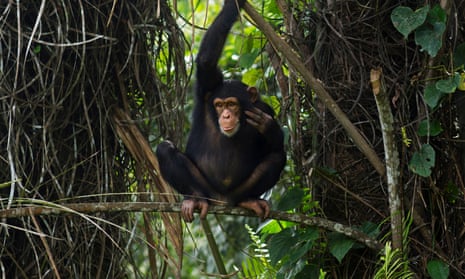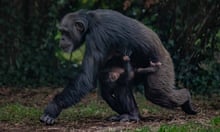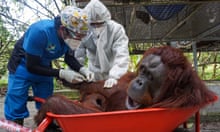It’s a bit garbled but you can definitely hear it in the mobile phone footage. As the chimpanzees arrange their branches into a makeshift ladder and one of them makes its daring escape from its Belfast zoo enclosure, some words ring out loud and clear: “Don’t escape, you bad little gorilla!” a child onlooker shouts from the crowd. And … POP … with that a tiny explosion goes off inside my head. Something knocks me back about this sentence. It’s a “kids-say-the-funniest things” kind of sentence, and in any other situation I’d offer a warm smile and a chuckle of approval. But not this time. This statement has brought out the pedant in me.
At this point, you may wonder if I’m capable of fleshing out a 700-word article chastising a toddler for mistakenly referring to a chimpanzee as a gorilla. The good news is that, though I am more than capable of such a callous feat, I don’t intend to write about this child’s naive zoological error. In fact, this piece isn’t really about the (gorgeous, I’m sure) child. It’s about us. You and me, and the words we use.
So let’s repeat it. That sentence, I mean. “Don’t escape, you bad little gorilla!” the child shouted. The words I’d like to focus on in this sentence are the words “you” and “bad”. The words “you” and “bad” are nice examples of a simple law of nearly all human languages. They are examples of Zipf’s law of abbreviation, where more commonly used words in a language tend to be shorter. It’s thought that this form of information-shortening allows the transmission of more complex information in a shorter amount of time, and it’s why one in four words you and I write or say is likely to be something of the “you, me, us, the, to” variety.
Language. Information. Communications efficiency. So far, so very human, you might argue. But wait. Because you’d be wrong. Because, of course, we humans aren’t the only ones to communicate using such laws of communication.
This week, scientists at the University of Roehampton described their analyses of 58 different types of “let’s play” gestures that chimpanzees give to one another in the wild – and these gestures also displayed Zipf’s law of abbreviation. The frequently used play gestures were shorter in length than less frequently used gestures. In other words, it turns out that our language law is also their law, to a degree. It’s a shared communications law. Even more wonderful than this, however, is that their play gestures also tick off another human communications law, Menzerath’s law, which predicts that larger linguistic structures are made up of shorter parts. Chimpanzees manage this, too.
For a topical example of a human word that obeys Menzerath’s law, take “Brexit” – a shortening that has freed up time to get our leave-the-EU negotiations done at top speed. In summary, this week’s scientific discovery means that if chimpanzees had a play-gesture for “British exit from the EU”, they would probably stumble across the same time-saving shortening as us. (Whether they would be able to do a better job of negotiating Brexit is, as yet, unknowable, but far from unimaginable.)
And so, back to our escaping chimp and the words of that excited toddler watching from the sidelines. As far as one-liners go, I’m happy to admit to you that “you bad little gorilla!” isn’t quite up there with Charlton Heston screaming, “You damn dirty apes!” at a crowd of latex-laden Hollywood extras, but I find that there is a certain delicious irony in its being blurted out by a child, itself learning unconsciously the rules of grammar and word-use that apply to all humans.
Deep down, we’re all toddlers, mastering the language bestowed on us by our ancestors. Deep down, we’re all using grammatical rules and communication laws without a moment’s consideration. And, spectacular as it seems, it turns out we’re not the only ones because the chimps are at it, too.
And so it seems opportune to finish with four of our simplest human words. They are little words and so, according to Zipf’s law, they are words that really matter. And they now apply to other species as much as to ours: me, you, them, us.










